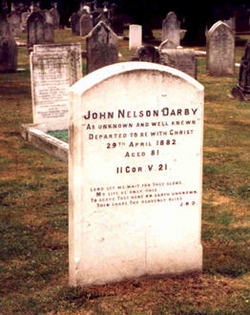 ‘After These Things’ Chapter 3.2 John Nelson Darby Biographical Note of a True Churchman
‘After These Things’ Chapter 3.2 John Nelson Darby Biographical Note of a True Churchman
3.2 J N Darby – a brief Biography

From our book ‘After These Things – Summaries of John Nelson Darby’s Papers on Prophecy – and more…’ Compiled by Daniel Roberts. For more about this book click on the picture or CLICK HERE
John Nelson Darby (1800-1882)

J N Darby (1800-1882), an Anglo-Irish evangelist, was led to the fierce conclusion that all sectarian churches, as man-made institutions, were bound to fail. The believer’s true hope was the return of the Lord Jesus Christ. With others, Darby gathered in a less formal way, free of clergy and human structure, founded on a desire to be separate from unholy organisations
J N Darby, after resigning his curacy in the Church of Ireland, became a tireless traveller, talented linguist and Bible translator. His influence is still felt in evangelical Christianity.
The following is based on WIKIPEDIA
Early years
J N Darby was born in Westminster, London, and christened at St. Margaret’s on 3 March 1801. He was the youngest of the six sons of John Darby and Anne Vaughan. The Darbys were an Anglo-Irish landowning family seated at Leap Castle, King’s County, Ireland, (present-day County Offaly). He was the nephew of Admiral Henry D’Esterre Darby and his middle name was given in recognition of his godfather and family friend, Lord Nelson.
Darby was educated at Westminster School and Trinity College, Dublin where he graduated Classical Gold Medallist in 1819. Darby embraced Christianity during his studies, although there is no evidence that he formally studied theology. He joined an inn of court but felt that being a lawyer was inconsistent with his religious belief. He, therefore, chose ordination as an Anglican clergyman in Ireland, “lest he should sell his talents to defeat justice.” In 1825, Darby was ordained deacon of the established Church of Ireland and the following year as a priest.
Middle years
J N Darby became a curate in the Church of Ireland parish of Delgany, County Wicklow, and distinguished himself by persuading Roman Catholic peasants in the Calary district within this parish to abandon the Catholic Church. The well-known gospel tract “How the Lost Sheep was Saved” gives his personal account of a visit he paid to a dying shepherd boy in this area, painting a vivid picture of his work among the poor people involved. He later claimed to have won hundreds of converts to the Church of Ireland. However, the conversions ended when William Magee, the Anglican Archbishop of Dublin, ruled that converts were obliged to swear allegiance to George IV as the rightful king of Ireland.
J N Darby resigned his curacy in protest. Soon afterwards, in October 1827, he fell from a horse and was seriously injured. He later stated that it was during this time that he began to believe that the “kingdom” described in the Book of Isaiah and elsewhere in the Old Testament was entirely different from the Christian church.
Over the next five years, he developed the principles of his mature theology most notably his conviction that the very notion of a clergyman was a sin against the Holy Spirit because it limited the recognition that the Holy Spirit could speak through any member of the Church. During this time (1827-28) he joined an interdenominational meeting of believers (including Anthony Norris Groves, Edward Cronin, J. G. Bellett, and Francis Hutchinson) who met to “break bread” together in Dublin as a symbol of their unity in Christ. By 1832, this group had grown and began to identify themselves as a distinct Christian assembly. As they travelled and began new assemblies in Ireland and England, the movement became known as the Plymouth Brethren.
It is believed that John Nelson Darby left the Church of Ireland around 1831. He participated in the 1831 Powerscourt Conference, an annual meeting of Bible students organized by his friend, the wealthy widow Lady Powerscourt (Theodosia Wingfield Powerscourt). At the conference, Darby publicly described his ecclesiological and eschatological views, including the pretribulation rapture. For about 40 years William Kelly (1821-1906) was a staunch supporter and edited the 34 volumes of Darby’s Collected Writings. Kelly in his work John Nelson Darby as I knew him stated that “a saint more true to Christ’s name and word I never knew or heard of”.
Later years
J N Darby travelled widely in Europe and Britain in the 1830s and 1840s and established many Brethren assemblies. He gave 11 significant lectures in Geneva in 1840 on the hope of the church (L’attente actuelle de l’Eglise) – Summarised in this site as ‘Darby Simplified – Present Hope of the Church‘. These established his reputation as a leading interpreter of biblical prophecy. America did not embrace Darby’s ecclesiology like it did his eschatology which is still being propagated (in various forms) at such places as Dallas Theological Seminary and by various authors and preachers.
In 1848, Darby became involved in a complex dispute over the proper method for maintaining shared standards of discipline in different assemblies that resulted in a split between Open Brethren, which maintained a congregational form of government and Exclusive Brethren. After that time, he was recognized as the dominant figure among the Exclusives, who also came to be known as “Darbyite” Brethren. He made at least 5 missionary journeys to North America between 1862 and 1877. He worked mostly in New England, Ontario, and the Great Lakes region, but took one extended journey from Toronto to Sydney by way of San Francisco, Hawaii, and New Zealand. He used his classical skills to translate the Bible from Hebrew and Greek texts into several languages. He wrote a Synopsis of the Bible initially in French, later translated into English, as well as many other scholarly religious articles. He wrote hymns and poems, the most famous being, ‘Man of Sorrows‘. He was also a Bible commentator. He translated the Bible with the help of various brethren in different countries into German, French and English. He declined, however, to contribute to the compilation of the Revised Version of the King James Bible even though the revisers consulted Darby’s work.

He died in 1882 in Sundridge House, Bournemouth and is buried in Bournemouth, Dorset, England.
John Nelson Darby is noted in the theological world as the father of “dispensationalism”, whose eschatology was adopted and later made popular in the United States by Cyrus Scofield’s Scofield Reference Bible.
Charles Henry Mackintosh, 1820-1896, with his popular style spread Darby’s teachings to humbler elements in society and may be regarded as the journalist of the Brethren Movement. Mackintosh popularised Darby more than any other Brethren author.
Darby has been credited with originating the pre-tribulation rapture theory wherein Christ will suddenly remove His bride, the Church, from this world to its heavenly destiny before the judgments of the tribulation. Thus the prophetic program resumes with Israel’s earthly destiny. Dispensationalist beliefs about the fate of the Jews and the re-establishment of the Kingdom of Israel put dispensationalists at the forefront of Christian Zionism, because God is able to graft them in again, and they believe that in His grace he will do so according to their understanding of Old Testament prophecy. They believe that, while the ways of God may change, His purposes to bless Israel will never be forgotten, just as He has shown unmerited favour to the Church, He will do so to a remnant of Israel to fulfil all the promises made to the genetic seed of Abraham. In 1829 he predicted the rebirth of a nation Israel over 100 years before it happened, just by reading the Bible (pgs. 141-160. Prophetic No. 1 Vol. 2.)
Some Biographies of JND.
John Nelson Darby/a Biography by Max S. Weremchuk
https://www.amazon.com/John-Nelson-Darby-Biography-Weremchuk/dp/0872139239
Also
Unknown and Well Know: a Biography of John Nelson Darby by W.G. Turner (Author), E.N. Cross (Editor)
https://www.amazon.com/Well-Know-Biography-Nelson-Darby/dp/1853072303/
One I have not read but was written by a close associate of JND
John Nelson Darby As I Knew Him by William Kelly (Author), Rani Publications (Editor)
https://www.amazon.com/John-Nelson-Darby-Knew-Him/dp/1521593965
Another less well known but one I found very interesting and whose author I know.
For Zion’s Sake: Christian Zionism and the Role of John Nelson Darby (Studies in Evangelical History and Thought) by Paul Richard Wilkinson (Author), Thomas Ice (Foreword)
https://www.amazon.com/Zions-Sake-Christian-Zionism-Evangelical/dp/1842275690
See also
JOHN NELSON DARBY: DEFENDER OF THE FAITH by Larry V. Crutchfield
http://www.according2prophecy.org/darby.html
Some also from this Website
For Christians in Perilous Times waiting for Jesus’ Call at the Rapture/
